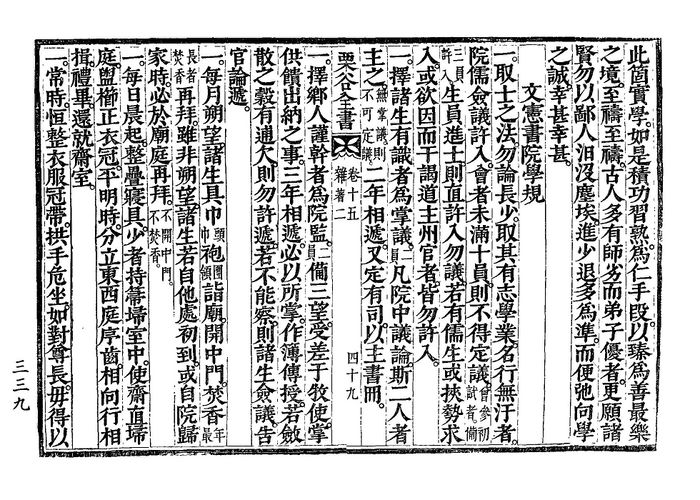(Translation) 文憲書院學規
| Primary Source | ||
|---|---|---|
 |
Title | |
| English | The Regulations of the Munheon Academy | |
| Chinese | 文憲書院學規 | |
| Korean(RR) | 문헌서원학규(Munheonseowon hakgyu) | |
| Text Details | ||
| Genre | Literati writings | |
| Type | Regulations | |
| Author(s) | 栗谷 李珥 | |
| Year | 1578 | |
| Source | ||
| Key Concepts | ||
| Translation Info | ||
| Translator(s) | Participants of 2017 Summer Hanmun Workshop (Advanced Translation Group) | |
| Editor(s) | ||
| Year | 2017 | |
목차
- 1 Introduction
- 2 Original Script
- 3 Translation
- 3.1 Student 1 : (Write your name)
- 3.2 Student 2 : King Kwong Wong
- 3.3 Student 3 : (Zhijun Ren)
- 3.4 Student 4 : Martin
- 3.5 Student 5 : (Young Suk)
- 3.6 Student 6 : (Write your name)
- 3.7 Student 7 : (Write your name)
- 3.8 Student 8 : (Kim Young)
- 3.9 Student 9 : (Write your name)
- 3.10 Student 10 : (Jong Woo Park)
- 3.11 Student 11 : (Write your name)
- 3.12 Student 12 : (Write your name)
- 3.13 Student 13 : (Write your name)
- 3.14 Student 14 : (Write your name)
- 4 Further Readings
Introduction
Original Script
| Classical Chinese | English |
|---|---|
|
文憲書院學規
7. 一。凡居處必以便好之地。推讓長者。毋或自擇其便。年十歲以長者出入時。少者必起。 一。凡食時。長幼齒坐。於飮食不得揀擇取舍。常以食無求飽爲心。 8.。讀書時。必端拱危坐。專心致志。務窮義趣。毋得相顧談話。. 一。凡言語必愼重。非文字禮法則不言。毋談淫褻悖亂神怪之事。毋談他人過惡。毋談朝廷政事。毋說州縣官員得失。 一。朋友務相和敬。相規以失。相責以善。毋得挾貴挾賢挾才挾父兄挾多聞見。以驕于儕輩。且不得譏侮儕輩。以相戲謔。違者黜座。(卽損徒也。解損時。必滿座面責。)
10. 一。院中書冊。毋得出于院門。違則罰其主者。重則黜院。輕則黜座。 一。春秋祭。無故不參者黜座。 一。寄名院籍。或有失身毀行。玷辱儒風者。則僉議削籍。 11. 一。四孟之月。掌議會諸生于院。講議學規。檢察諸生得失。無故不參者黜座。有故則必具單子。告其由。 凡初入院者。必使先讀學規。 |
(translation) |
Translation
Student 1 : (Write your name)
- Discussion Questions:
Student 2 : King Kwong Wong
2. 一。擇諸生有識者爲掌議(二員)。凡院中議論。斯二人者主之。(無掌議。則不可定議。) 二年相遞。又定有司。以主書冊。
- Discussion Questions:
- How did Yi I and his academy enforce its regulations? Given the high-handed nature of the regulations, how do they reflect the quality of students?
- Why do the regulations forbid discussion of politics? Is it a consequence of the literati purges during the Chosŏn period?
Student 3 : (Zhijun Ren)
- Discussion Questions:
Yi I seems to place great emphasis on individual cultivation and the proper relation between peers. What does it tell us about Yi I’s envisioning of an ideal academy?
Student 4 : Martin
- Discussion Questions:
1. Considering that students of different (yangban-) backgrounds could enter the academies, do you think Yulgoks emphasis on the order of seniority could have been problematic at times? What times could that be?
2. Looking at modern school systems some of this rules seem quite obvious, check your schools regulations for similarities and differences?
Student 5 : (Young Suk)
a
- Discussion Questions:
Student 6 : (Write your name)
- Discussion Questions:
Student 7 : (Write your name)
- Discussion Questions:
Student 8 : (Kim Young)
- Discussion Questions:
Student 9 : (Write your name)
- Discussion Questions:
Student 10 : (Jong Woo Park)
10.
一。院中書冊。毋得出于院門。違則罰其主者。重則黜院。輕則黜座。
一。春秋祭。無故不參者黜座。
一。寄名院籍。或有失身毀行。玷辱儒風者。則僉議削籍。
- Discussion Questions:
(1) What kind of Confucian culture or values do these regulations represent?
(2) Is what Yi I emphasizes in this document universal--shared by Confucian societies in other parts of the world--or specific to Korea?
Student 11 : (Write your name)
- Discussion Questions:
Student 12 : (Write your name)
- Discussion Questions:
Student 13 : (Write your name)
- Discussion Questions:
Student 14 : (Write your name)
- Discussion Questions:

